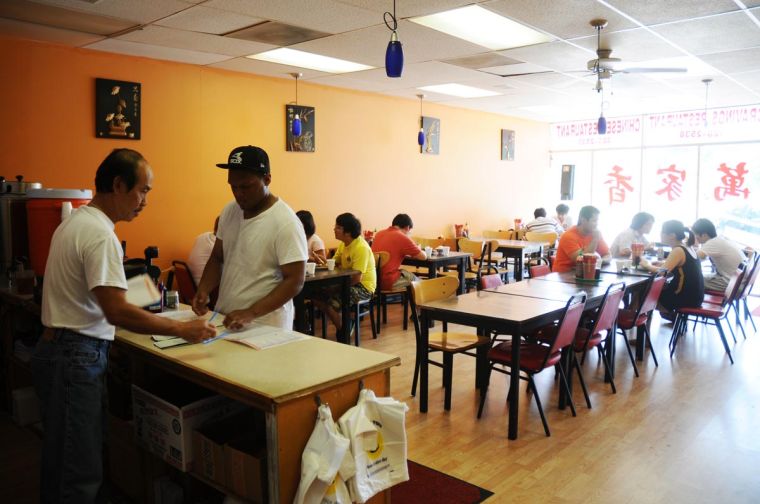Cravings, local restaurants fail December health inspections
Sze Tho, employee at Cravings, helps a customer on July 12, 2011. Cravings recently failed its seventh health inspection.
March 13, 2014
A popular Chinese restaurant on campus will have to close its doors if it fails another health inspection this year.
Cravings, located at 603 S. Wright St. in Champaign, is one of six local restaurants that failed its December health inspection conducted by the Champaign-Urbana Public Health District. Cravings’ owner Yangxiang Tang said this is the seventh time that Cravings has failed its health inspection, and if the restaurant fails to pass another inspection this year, it will be closed and lose its permit to operate.
The other five restaurants that failed inspections are: B Won Korean Restaurant, 2006 S. Neil St., Champaign; Ambar India Restaurant, 605 S. Wright St., Champaign; Sakanaya Restaurant, 403 E. Green St., Champaign; Shanghai 1938, 2504 Village Green Place, Champaign; and Sitara Indian Restaurant and Lounge, 114 S. Race St, Urbana.
The Champaign-Urbana Public Health District inspected 766 facilities in Champaign and Urbana and 318 in the rest of Champaign County, said Sarah Michaels, environmental health programs coordinator at the health district.
“Restaurants get inspected several times a year depending on their food handling,” Michaels said. “The more complex their food preparation is, the more we come and visit them. So, for example, restaurants that serve foods like sushi get three contacts a year, but other places like fast food restaurants get visited once per year.”
Get The Daily Illini in your inbox!
If a restaurant gets a score below 36 percent, it fails its health inspection. If they get a score below zero, they’re immediately closed down, Michaels said. This happened to Cravings in December when they received a score of negative three with 10 critical violations.
Inspectors cited the restaurant for not cooking pork and storing chicken in proper temperatures, stacking food product beyond limits of capacity in its walk-in cooler, leaving produce on the same preparation table used for raw meat, not sanitizing equipment properly, having an opening on their screen door and not having chemical spray bottles labeled, according to the official report by Champaign-Urbana Public Health District from Dec. 5, 2013.
“We just get a lot of customers, and it gets really busy especially during lunch and dinner hours,” Tang said. “We don’t have time to fix everything in the kitchen because we are all really busy focused on serving the customers instead.”
Ambar India also failed its health inspection when it received a score of 11 out of 100 with nine critical violations last December.
Some of the violations included not having food cooked and cooled the day before stored in proper temperatures, not setting the dish machine on appropriate settings, leaving unwashed dishes piled on a shelf, not labeling spray bottles and leaving personal medications near food preparation areas, according to the official report from Dec. 5, 2013.
“We’re glad that we got cited for a lot of minor things” said Dharminder Singh, owner of Ambar India. “The violations that we got cited on are relatively easy to fix, so now we know not to make careless mistakes next time.”
Sakanaya, a sushi and ramen restaurant that opened last November, also failed its first health inspection with a score of 22 and 7 critical violations. Major violations included not having a food handler in the facility during the course of the inspection and while food was being prepped, freezing fish improperly and not labeling containers of frozen fish, according to the report from Dec. 4, 2013.
“We’re a new restaurant so we got docked on a lot of points for not being prepared when they came in for our initial inspection,” said Jin Park, owner of Sakanaya. “As we get going, I’m hopeful that we can fix things along the way so that we can continue to pass our health inspections.”
Similar to Ambar India, which received a score of 58 on Dec. 16, 2013, and Sakanaya which got a score of 87 on Dec. 18, 2013, after making improvements and corrections, Cravings got a score of 91 after re-inspection on Dec. 9, 2013.
Although re-inspection typically happens 30 days after the initial inspection, recently, restaurant owners are pushing to be re-inspected immediately because of the placards.
“We recently passed an initiative where food vendors have to display the results of their recent health inspections on the facility’s front door,” Michaels said. “Because of this, more restaurant owners want to get inspected right away, so we are working on a way to be more effective on re-inspecting after we place the placards.”
Some changes that Cravings made to help them adhere to proper food handling in the future include ordering smaller quantities of food so that the staff is not overwhelmed. They also changed minor things like adding more shelves and storing food in smaller containers to help keep it at safe temperatures, Tang said.
“We made all these changes, so hopefully they’ll follow it and help follow the health codes,” Tang said. “I hope that we can stay opened to continue offering students good, healthy and affordable Chinese food.”
Julianne can be reached at [email protected].







